Kaldor City (audio series): Difference between revisions
Tag: sourceedit |
Claude North (talk | contribs) Tag: sourceedit |
||
| Line 5: | Line 5: | ||
[[Alan Stevens]] had the idea for an audio series loosely based on a film called {{w|Yojimbo}} by Akira Kurosawa. The film is about a Samurai who plays two powerful families off against one another in order to benefit himself. | [[Alan Stevens]] had the idea for an audio series loosely based on a film called {{w|Yojimbo}} by Akira Kurosawa. The film is about a Samurai who plays two powerful families off against one another in order to benefit himself. | ||
Around this time, [[BBC Books]] published a ''[[Doctor Who]]'' novel titled ''[[Corpse Marker (novel)|Corpse Marker]]'' as part of its line of [[BBC Past Doctor Adventures|Past Doctor Adventures]]. Written by [[Chris Boucher]] it served as a sequel to his 1977 ''Doctor Who'' story ''[[The Robots of Death (TV story)|The Robots of Death]]'' and was also a crossover with the BBC television series ''[[Blake's 7]]'' due to the inclusion of [[Carnell]], a character originating in that series. Stevens contacted Boucher and proposed the idea of an audio drama using the setting established in ''[[Corpse Marker (novel)|Corpse Marker]]'' named Kaldor City. Boucher encouraged Stevens to write the script, which he wrote | Around this time, [[BBC Books]] published a ''[[Doctor Who]]'' novel titled ''[[Corpse Marker (novel)|Corpse Marker]]'' as part of its line of [[BBC Past Doctor Adventures|Past Doctor Adventures]]. Written by [[Chris Boucher]] it served as a sequel to his 1977 ''Doctor Who'' story ''[[The Robots of Death (TV story)|The Robots of Death]]'' and was also a crossover with the BBC television series ''[[Blake's 7]]'' due to the inclusion of [[Carnell]], a character originating in that series. Stevens contacted Boucher and proposed the idea of an audio drama using the setting established in ''[[Corpse Marker (novel)|Corpse Marker]]'' named Kaldor City. Boucher encouraged Stevens to write the script, which he wrote in collaboration with [[Jim Smith]]. Pleased with the results, Boucher gave his full approval to proceed with the concept.<ref>[http://www.kaldorcity.com/aboutus.html About Kaldor City and Magic Bullet]</ref> | ||
Stevens initially approached [[BBV Productions|BBV]], an audio and video production company specialising in ''[[Doctor Who]]'' related productions, with the script but showed little interest in the idea. [[Big Finish Productions|Big Finish]], a prodcution company licensed by the BBC to produce ''Doctor Who'' audio drama, were also approached. Ultimately, Stevens decided to produce it himself and so set up a company called [[Magic Bullet Productions|Magic Bullet]]. | Stevens initially approached [[BBV Productions|BBV]], an audio and video production company specialising in ''[[Doctor Who]]'' related productions, with the script but showed little interest in the idea. [[Big Finish Productions|Big Finish]], a prodcution company licensed by the BBC to produce ''Doctor Who'' audio drama, were also approached. Ultimately, Stevens decided to produce it himself and so set up a company called [[Magic Bullet Productions|Magic Bullet]]. | ||
Revision as of 12:56, 14 July 2015
Kaldor City is the setting and title of a series of audio plays produced by Magic Bullet Productions. It previously featured in the television story The Robots of Death and the novel Corpse Marker. The series uses characters, concepts and situations from those stories. It also sees the return of the Fendahl from Image of the Fendahl. The writer of those productions Chris Boucher is credited as creative consultant for the series. Boucher also wrote the second release, Death's Head.
Origins
Alan Stevens had the idea for an audio series loosely based on a film called Yojimbo by Akira Kurosawa. The film is about a Samurai who plays two powerful families off against one another in order to benefit himself.
Around this time, BBC Books published a Doctor Who novel titled Corpse Marker as part of its line of Past Doctor Adventures. Written by Chris Boucher it served as a sequel to his 1977 Doctor Who story The Robots of Death and was also a crossover with the BBC television series Blake's 7 due to the inclusion of Carnell, a character originating in that series. Stevens contacted Boucher and proposed the idea of an audio drama using the setting established in Corpse Marker named Kaldor City. Boucher encouraged Stevens to write the script, which he wrote in collaboration with Jim Smith. Pleased with the results, Boucher gave his full approval to proceed with the concept.[1]
Stevens initially approached BBV, an audio and video production company specialising in Doctor Who related productions, with the script but showed little interest in the idea. Big Finish, a prodcution company licensed by the BBC to produce Doctor Who audio drama, were also approached. Ultimately, Stevens decided to produce it himself and so set up a company called Magic Bullet.
In assembling the key players, Stevens hired sound designer Alistair Lock whom he previously worked with on a series of Blake's 7 audio productions; Travis: The Final Act, The Mark of Kane, and The Logic of Empire. Stevens created the character of Kaston Iago specifically for Paul Darrow, best for the role of 'Kerr Avon' in Blake's 7. Alexis Kanner from the ITC television series The Prisoner was also considered for the role should Darrow prove unavailable.
Using his casting connections from the Blake’s 7 audios, Stevens approached Darrow who agreed to play the role. Series regulars Trevor Cooper, Brian Croucher and Peter Miles were also known to Stevens from the same audio productions. Russell Hunter was contacted through a friend of Stevens and agreed to reprise the role of Uvanov from The Robots of Death. Scott Fredericks who originally played the role of Carnell in the Blake’s 7 episode Weapon proved more difficult to track down due to residing in Ireland. Stevens eventually got in touch through BBC Residuals, who kindly forwarded a copy of the script. Stevens later recalled: "I’d written a script with Carnell in before I’d even contacted the actor. It would have been a terrible mess if he’d decided not to do it."[2]
Audio plays
| # | Image | Title | Author | Released |
|---|---|---|---|---|
| 1 | 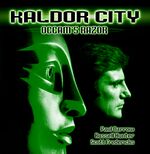
|
Occam's Razor | Alan Stevens Jim Smith |
September 2001 |
| 2 | 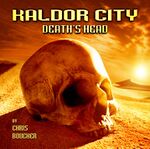
|
Death's Head | Chris Boucher | April 2002 |
| 3 | 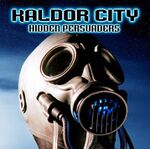
|
Hidden Persuaders | Jim Smith Fiona Moore |
November 2002 |
| 4 | 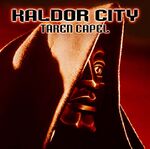
|
Taren Capel | Alan Stevens | March 2003 |
| 5 | 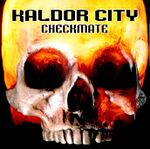
|
Checkmate | Alan Stevens | September 2003 |
| 6 | 
|
Storm Mine | Daniel O'Mahony | December 2004 |
Main cast
- Kaston Iago - Paul Darrow
- Kiy Uvanov - Russell Hunter
- Carnell - Scott Fredericks
- Layly Landerchild - Peter Miles
- Stenton Rull - Trevor Cooper
- Cotton - Brian Croucher
- Justina Kessel - Patricia Merrick
- Elska Blayes - Tracy Russell
Guest starring
(bracketed number refers to story)
- Strecker - Peter Tuddenham (1, 2)
- Daniel Packard - Nicholas Courtney (3, 4, 5)
- Paullus - David Collings (3, 4, 5)
- Zala Vance - Jasmine Breaks (3, 4)
- Taren Capel - David Bailie (4, 5)
- Derhaven - Peter Halliday (5)
- Chief Mover - John Leeson (6)
- Commander - Philip Madoc (6)
- Voc 23 - Gregory de Polnay (6)
Special productions
| Type | Image | Title | Author | Released |
|---|---|---|---|---|
| AUDIO | 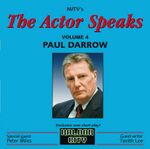
|
The Prisoner | Alan Stevens Fiona Moore |
2004 |
| PROSE | 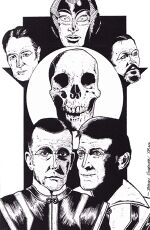
|
Skulduggery | Alan Stevens Fiona Moore |
2006 |
| AUDIO | 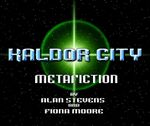
|
Metafiction | Alan Stevens Fiona Moore |
July 2012 |
| SP | 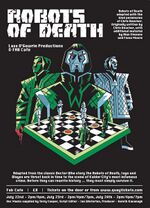
|
Robots of Death | Chris Boucher Adapted by Alan Stevens Fiona Moore |
July 2012 |
| SP | 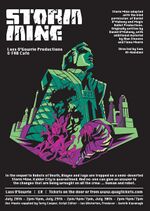
|
Storm Mine | Daniel O'Mahony Adapted by Alan Stevens Fiona Moore |
July 2012 |
Notes
- Uvanov, Poul and Taren Capel are the only characters from The Robots of Death to appear in the series.
- The character of Kaston Iago is named after the manipulative character of the same name from Shakespeare's Othello and the noted Shakespeare editor David Kastan.
- The series is notable for its lack of incidental music instead relying almost solely on a diegetic soundscape to create the atmosphere. The theme tune, composed by Alistair Lock, is roughly based on 'Avon's theme', which he previously used in a series of unofficial Blake's 7 audio productions.
- The Prisoner is a twenty minute play released as part of an MJTV Productions CD, The Actor Speaks: Paul Darrow, which featured an interview and several short stories unrelated to the series.
- Skulduggery is a short story written by Alan Stevens and Fiona Moore, which appeared in the 2006 charity anthology Shelf Life.
- In 2012, two stage plays were performed based upon the continuity established by the series: Robots of Death and Storm Mine. These were adapted by Alan Stevens and Fiona Moore from the television and audio stories of the same name. In the case of Robots of Death all the BBC owned elements were removed, notably the Doctor and Leela replaced by Kaston Iago and Elska Blayes.
- Kaldor City was written as a six-part audio series. Since the release of Storm Mine there have been four attempts to develop a new 'Kaldor City' story by established Doctor Who and/or spinoff writers, none of which have, to date, managed to progress beyond the draft stage. Series producer Alan Stevens maintains, "If there's an interesting enough idea out there, the series will continue, but at the moment we're waiting for that idea to come along.[3]In fact, Fiona and I even wrote Kaldor City 7 ourselves, and then threw it away, because it just proved to us that the series had come to a natural end with Storm Mine."[4]
External links
Footnotes
- ↑ About Kaldor City and Magic Bullet
- ↑ The True History of Magic Bullet: An interview with Alan Stevens, producer of Kaldor City and Faction Paradox. (Part 1 of 2)
- ↑ The True History of Faction Paradox: Frequently Asked Questions
- ↑ The True History of Magic Bullet: An interview with Alan Stevens, producer of Kaldor City and Faction Paradox. (Part 1 of 2)
